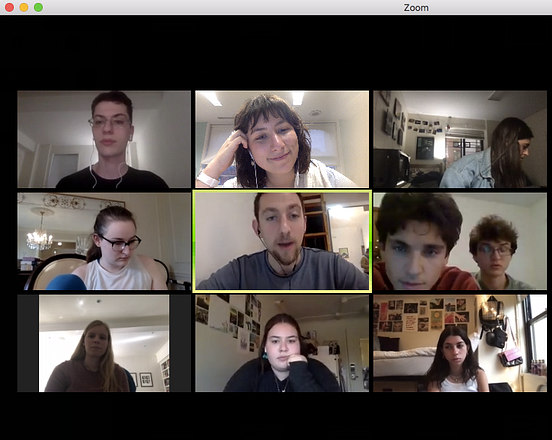Parshat Ki Tisa: D’var by Mitchell LaDue
The spread of the Corona virus is a lot like that time I tried to grow a mustache: it’s making everything in my life different and worse. And is especially alarming to my grandparents. It’s true, things are different now: classes are online, community centers like Bronfman are closing, and I now have to constantly wash my hands while singing “Happy Birthday”, instead of just washing my hands once a year on my birthday like I’m used to.
There’s a sort of anxiety in the air that I haven’t really experienced before, not that general nervousness is an uncommon feeling to the Jewish people. It’s something you feel when sitting in the car with four or more blood relatives, or seeing a line for the bathroom on cholent night. But the anxiety is different now, and while the virus is an obvious cause, I couldn’t quite place all of the factors at play until I read this week’s parsha, Ki Tisa.
Ki Tisa is all about the Jews waiting to receive the ten commandments. And while yes, this was a good thing, the way they were receiving them wasn’t ideal. They weren’t getting instant access to the ten commandments in a Buzzfeed listicle (“#5: Murder = Bad”). Instead, Moses was supposed to get the tablets directly from G-d.
So he climbed up Mount Sinai and told the Jewish people to hang out until he got back. And they did, for forty days and forty nights. But when he still hadn’t returned, they started to get worried, because they saw “that Moses was late in coming down from the mountain” and “[didn’t] know what [had] become of him”. It was the uncertainty that was making them anxious. And the fact that they had been waiting for things to turn around, but the timeline kept being pushed further and further back. Adding to this anxiety was the fact that they didn’t have anything to do. They used to travel through the desert and make sacrifices. Now they were just sitting around, bored, waiting for someone to invent Mad Libs.
All of these ring true today, even that last part. Not only have schools and offices been shut down, it feels like everyday something new is being cancelled as well. First it was sports, then theater, and on Wednesday I saw The Masked Singer trending and thought “at least something good came of the virus”, until I learned that, unmercifully, it is still very much going on.
And while all of these are reasons that we understand the mental state that the Israelites were in, it doesn’t make what they did next any better. Like any parent whose youngest child just went off to college, the Jewish people channeled their newfound anxiety and free time into an arts and crafts project. But unlike the felt painting you said you liked, the intent here was wicked and blasphemous. The Jewish people made a golden idol of a calf, which they hailed as their new god. And as you can imagine, this didn’t go over great with their current god. He had just freed them from Egypt and slavery, and here they were, reverting to their old practice of idol worship, making sacrifices to a piece of metal with udders. In his rage, God said to Moses “I have seen these people and behold! They are a stiff-necked people.”
“Stiff-necked” is apparently not only a symptom of sitting for three consecutive Zoom lectures, it’s also a term our God used to disparage his own people. It means that we are stubborn, set in our ways, reluctant to change. And God was right to lash out, although, with the advent of the comments section, it might not seem like the cutting insult it once was.
This parsha serves as a pretty clear outline of what not to do in a time of crisis. Which means I’ve had to stop construction on the porcelain Andy Hamilton I was building (It’s almost as shiny as the real one!). But this parsha doesn’t give us a lot of insight into what we actually should do at a time like this, and to be honest, I really don’t know what will happen. Even with a seeming constant in my life like the Bronfman Center community, there’s a lot of uncertainty. The building itself is closing and gatherings and shabbats are stopping for a while. I was worried, thinking about the lack of a weekly schmooze, and the fact that no one will be there to tell me which of the vegetables are gross and which ones are good to eat. I was worried that without the one place I had to be spiritual, the closest I will come is the almost religious awe I have for my microwave when it turns a frozen pizza roll into a delicious meal. Most of all, I was worried that the connected nature of this community, and the importance we have in each other’s lives, might change.
But lucky for us, we are a stiff-necked people. We are stubborn, set in our ways, reluctant to change. That doesn’t mean things won’t be different, but we’ll be able to adapt. “Tea with Talia” is becoming “virtual Tea with Talia”, JLF classes will be on zoom, and now, if I forget to wear pants to a conference, it’ll probably lead to a lot less screaming. Things will be different and things will be virtual, but the things that make the Jewish community on campus a community won’t change.


The spread of the Corona virus is a lot like the time I tried to grow a mustache, except this time, I know that people won’t abandon me in this time of crisis.

















